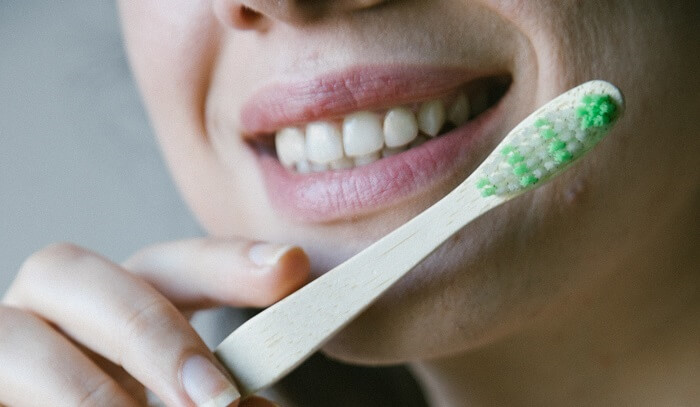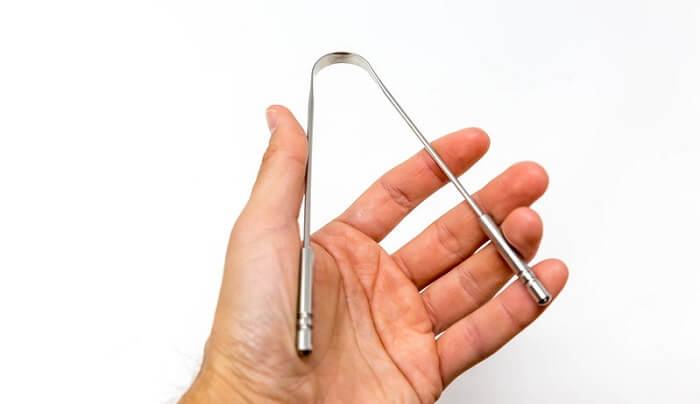When you think about keeping good oral hygiene, you may think of brushing your teeth and flossing daily. However, it may come to a surprise that cleaning your tongue is just as important when it comes to your oral health.
The tongue is the biggest carrier of many types of bacteria. While most of them are actually helpful for your mouth, there are some that are harmful.1 When left neglected, the tongue becomes overloaded with bad bacteria that contribute to plaque, periodontal disease, and inflammation, all of which can lead to various types of diseases throughout the body.2
This is why keeping your tongue’s bacteria under control is so important. One of the best ways to do this is through the method of tongue scraping.
What is tongue scraping?
Tongue scraping perhaps sounds a bit bizarre, but it has been practiced throughout centuries and throughout various cultures.3 The name itself makes the practice seem intense or a bit painful; however, it is quite the opposite.
The practice is done after brushing and flossing by using a thin, smooth tool to gently scrape collected bacteria, dead tissue, and other debris from the back to the tip of your tongue’s surface.
Scraping your tongue is not meant to replace brushing and flossing, but it is certainly a good step to add to keep your mouth happy and healthy.
Benefits of tongue scraping

When done consistently, tongue scraping provides various types of benefits. Here are the benefits that research has found so far:
- Reduces bad bacteria – The biggest benefit of tongue scraping is the reduction of bad bacteria, which is the culprit of gingivitis, periodontal disease, and tooth decay. Interestingly, this is not only a benefit for your mouth. Research has shown how an unhealthy mouth can create systemic disease.4 By scraping your tongue, you’re also preventing harmful bacteria in your mouth from affecting the rest of your body.
- Alerts you to other health issues – Cleaning your tongue can alert you to possible ongoing diseases happening in your body that you might not have noticed. Scraping away the white film off your tongue gives you view of any discoloration or surface abnormalities which are possible signs of various diseases in your body, such as
cardiovascular disease, stroke, respiratory infection, pancreatic cancer, and nutritional problems5 - Relieves bad breath – Scraping your tongue significantly reduces oral malodor created from types of accumulated bacteria and debris. Of course, this doesn’t prevent bad breath since bacteria quickly returns after being scraped off. However, scraping allows you more time of having fresher breath, saving yourself and others from smelling what you ate throughout the day.
- Helps sense of taste: Scraping away the various bacteria and debris stimulates your taste buds, allowing you to enhance your tasting ability and enjoy your meals a lot more.
- Makes the tongue look and feel better – Scraping away the buildup on your tongue can leave it feeling light and smooth. In addition, with the buildup gone, the thick white coat on your tongue is no longer visible. Instead, your tongue looks healthy and pink.6
Are there any side effects?
Despite these benefits of tongue scraping, there are some things to watch out for:
- Be careful not to trigger your gag reflex from going too far back too soon on your tongue with your scraper. If you feel that you are prone to a sensitive gag reflex, gradually scrape as far back as you can, not to trigger your gag reflex, which can lead to vomiting.
- Make sure to check your tongue scraper for uneven surface and rough edges every time you are going to use it. Uneven surfaces or rough edges can increase the risk of cutting your tongue when scraping.
- Scrape your tongue gently by not adding too much pressure while you scrape. If you’re adding too much pressure while you scrape, you could damage your taste buds and overall surface of your tongue. You want to apply just enough pressure to get the coating off your tongue. Start out with light pressure, then adjust if needed.7
Tongue scraping vs. brushing your tongue

Rather than using a tongue scraper, wouldn’t it be better to use a toothbrush or tongue brush?
It’s a common belief that brushing your tongue is just as effective as scraping it. However, studies have shown that scraping your tongue removes more bacteria than brushing by 30%.6
Additionally, since it’s easier for bacteria to get trapped on the bristles, it may be harder to clean off any bacteria on a brush compared to a scraper. Thus, you risk making cleaning your tongue less effective every time you brush.
How to clean your tongue
Tongue scraping is recommended to do after brushing and flossing your teeth. For best results, follow these steps:
- Stick out your tongue far enough for you to scrape the back of your tongue comfortably.
- Place the scraper on the back of the tongue. Be careful not to go too far that it will trigger your gag reflex.
- Make sure the scraper is sitting flat on your tongue, but not too much pressure as to cause pain.
- Gently scrape from the back of the tongue to the tip.
- Rinse the scraper off after every scrape.
- Repeat until scraping the whole surface of the tongue.
- When finished, make sure to rinse and wipe the scraper.
- Leave to dry in a cool, dry area.
Which type of tongue scraper to use
When searching for a tongue scraper, there are a lot of shapes and sizes to choose from. Plastic, stainless steel, and copper are the most common materials used for scrapers. However, research is limited as to which is better.

In general, stainless steel or copper scrapers are preferred because they last longer and are easier to stay clean compared to the plastic scrapers. However, in the end, there seems to be no significant difference among the three. Really it comes down to your preference as to which one to use.
If you do choose to use a plastic tongue scraper, it is good to replace it every 3-4 months, while copper and stainless steel can last for years.4 However, this also depends on how good of condition you keep your metal scraper.
How often you should scrape your tongue
It’s suggested to scrape your tongue twice a day after brushing to effectively decrease the amount of bad bacteria in your mouth.7 Scraping your tongue at night can help to get rid of morning breath, while scraping in the morning can help jumpstart your digestion for the day.
Remember to scrape with moderation and care. If the amount of scraping seems to be harming your tongue or is painful, reduce the amount of times you scrape or stop completely. It is also important to consult a professional if you are experiencing this.
Tongue scraping balancer Virtual Item
ZYTO technology allows you to scan a wide range of digital signatures representing various wellness services. Tongue Scraping is one of the many service Virtual Items available to scan in ZYTO Balance, Select, and Elite systems. While virtually anyone can benefit from scraping their tongue, you should especially consider adding tongue scraping to your daily routine if it shows up as one of the top services in your scan.
 About Calyn Waterlyn
About Calyn Waterlyn
Calyn Waterlyn became a teacher after obtaining a Bachelor of Arts Degree in English. In addition to teaching, she has also written articles on various topics including health and wellness. Calyn is passionate about living a healthy lifestyle and sharing her knowledge with others.
Sources:
1. Winnier, J. J., S. Rupesh, et al. “The Comparative Evaluation of the Effects of Tongue Cleaning on Existing Plaque Levels in Children.” International Journal of Clinical Pediatric Dentistry 6, no.3 (2013): 188-192.
2. Haumschild, M.S., & R.J. Haumschild. “The Importance of Oral Health in Long-Term Care.” Journal of the American Medical Directors Association 10 no. 9 (2009): 667-671.
3. Christian, A.G., & B.Z. Swanson Jr. “Oral Hygiene: a history of tongue scraping and brushing.” Journal of American Dental Association 96, no. 2 (1978): 215-219.
4. Napitu, Amanda. “How to Use a Tongue Scraper for Better Oral Hygiene.” Dentaly.org.
5. “Tongue Scraping : benefits, side effects and how to do it.” For Care Education and Research. Fcer.org
6. Nall, Rachel. “5 Reasons to Scrape Your Tongue and How to Do It.” Healthline Media a Red Ventures Company. Healthline.com
7. “How to Clean Your Tongue to Avoid Bad Breath.” Colgate Palmolive Company. Colgate.com